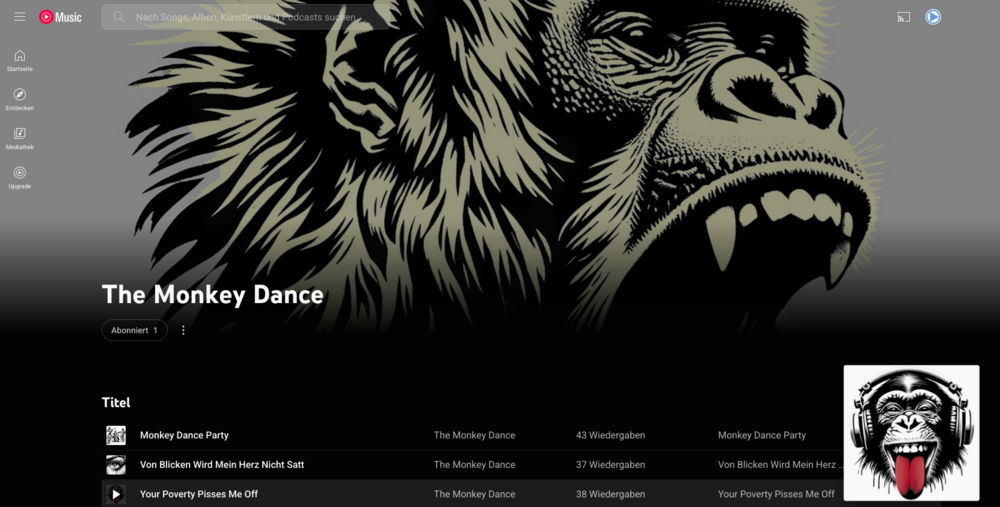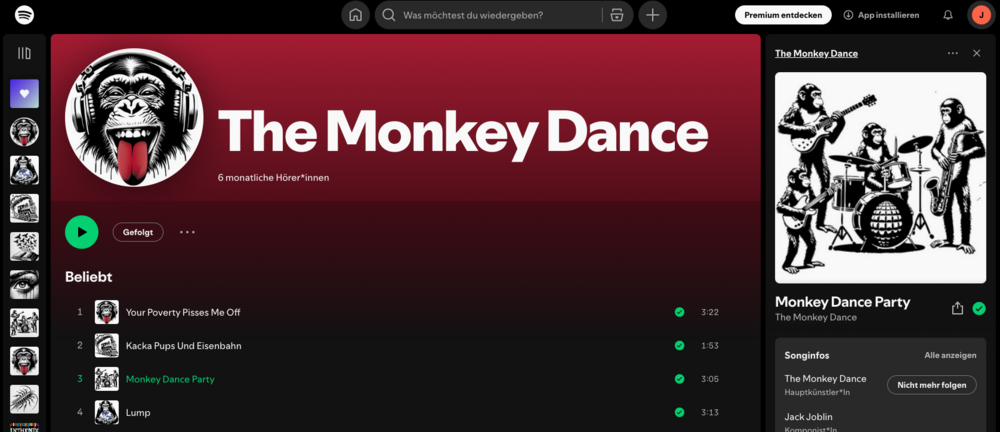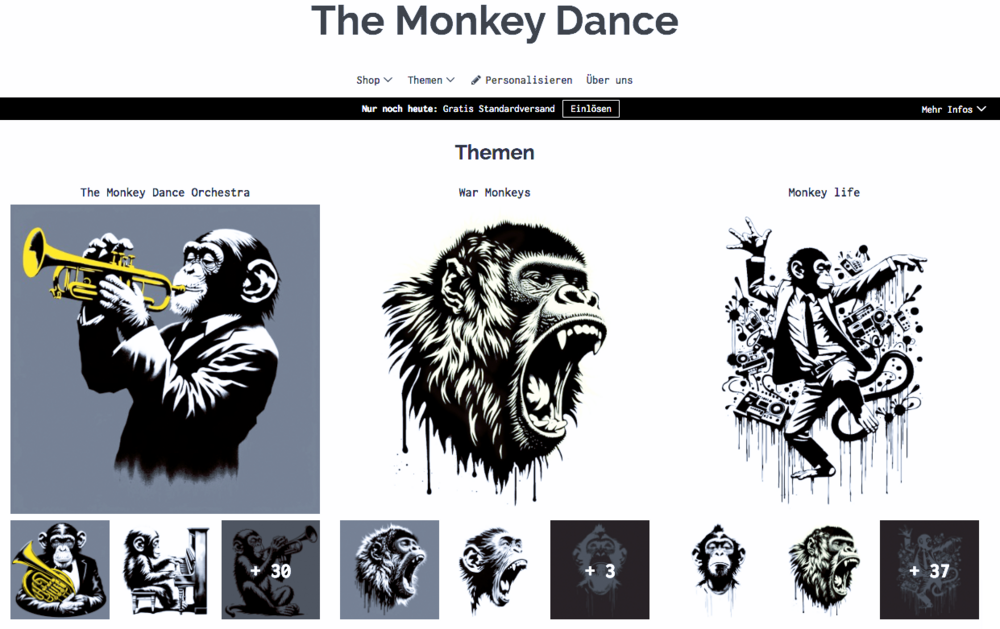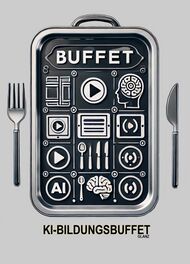

MUSIC QUIZ










Schulfach+


aiMOOCs



aiMOOC Projekte


YouTube Music: THE MONKEY DANCE

Spotify: THE MONKEY DANCE

Apple Music: THE MONKEY DANCE

Amazon Music: THE MONKEY DANCE

The Monkey Dance SpreadShirtShop

|
|
|


Children for a better world >> Förderung der AI Fair-Image Challenge
Fair-Image wird von CHILDREN JUGEND HILFT! gefördert und ist mit der deutschlandweiten AI Fair-Image Challenge SIEGERPROJEKT 2025. Alle Infos zur Challenge hier >>. Infos zum Camp25 gibt es hier. Wenn auch Ihr Euch ehrenamtlich engagiert und noch finanzielle Unterstützung für Eurer Projekt braucht, dann stellt gerne einen Antrag bei JUGEND HILFT.
- Absquatulate: To leave abruptly.
- Agastopia: Admiration of a particular part of someone's body.
- Ailurophile: A cat lover.
- Allegator: Humorous for 'alligator.'
- Alpenglow: A reddish glow near sunrise or sunset on the mountaintops.
- Anemone: A plant or flower, sounding whimsically like 'an enemy.'
- Anfractuous: Full of twists and turns.
- Antimacassar: A cover for chair backs to prevent soiling from hair oils.
- Apoptosis: The process of programmed cell death, often quipped in biology humor.
- Appaloosa: A breed of horse, noted for its colorful spotted pattern.
- Apple-knocker: Rural, unsophisticated person.
- Arachibutyrophobia: The fear of peanut butter sticking to the roof of the mouth.
- Archipelago: A large group of islands, sounds more complex than it is.
- Argle-bargle: Copious but meaningless talk or writing.
- Argy-bargy: A lively or contentious argument.
- Armadillo: A small American mammal with a leathery armor shell.
- Asthenosphere: The upper layer of the earth's mantle, below the lithosphere.
- Astraphobia: Fear of thunder and lightning.
- Autotomy: The ability of an animal to release a part of its body and regrow it.
- Avuncular: Relating to an uncle, often used humorously in describing a kindly demeanor.
- Babushka: A headscarf, tied under the chin, typical in Eastern Europe.
- Bafflegab: Confusing or generally unintelligible jargon.
- Baksheesh: A term used for a small bribe or tip in parts of Asia.
- Balderdash: Senseless talk or writing; nonsense.
- Ballyhoo: Extravagant publicity or fuss.
- Bamboozle: To fool or cheat someone.
- Bandicoot: An Australian marsupial, oddly named and looking.
- Barnstorm: To travel around the countryside making political speeches, performances, etc.
- Bazooka: A portable rocket launcher, also whimsically used for its sound.
- Bedlam: A scene of uproar and confusion.
- Befuddle: To make someone unable to think clearly.
- Bibliopole: A person who buys and sells books, especially rare ones.
- Bilge: The lowest part of the ship, often used to express nonsense ('bilge talk').
- Bilirubin: A yellow compound that occurs in the normal catabolic pathway that breaks down heme in vertebrates.
- Bivouac: A temporary camp without tents or cover, used especially by soldiers or mountaineers.
- Blabbermouth: A person who talks too much, especially revealing secrets.
- Blatherskite: A person who talks at great length without making much sense.
- Blunderbuss: An old-fashioned firearm with a broad, flared muzzle.
- Bobolink: A North American songbird; the name itself sounds humorous.
- Borborygmus: A rumbling or gurgling noise made by the movement of fluid and gas in the intestines.
- Cacodemonomania: The pathological belief that one is inhabited by an evil spirit.
- Cacophony: A harsh, discordant mixture of sounds.
- Callipygian: Having well-shaped buttocks.
- Canoodle: To engage in affectionate, often playful cuddling or kissing.
- Cantankerous: Bad-tempered, argumentative, and uncooperative.
- Capricious: Given to sudden and unaccountable changes of mood or behavior.
- Caterwaul: To make a shrill howling or wailing noise.
- Claptrap: Absurd or nonsensical talk or ideas.
- Cobweb: A spider's web, especially when old and covered with dust.
- Cockalorum: A small, self-important man.
- Codswallop: Nonsense.
- Collywobbles: Intense anxiety or nervousness, especially with stomach queasiness.
- Corker: Something that is particularly excellent or outstanding.
- Cornucopia: A symbol of plenty consisting of a goat's horn overflowing with flowers, fruit, and corn.
- Crapulence: Sickness caused by excessive eating or drinking.
- Crepuscular: Resembling or relating to twilight; active during the twilight.
- Crinkum-crankum: Elaborate or detailed.
- Crudivore: An eater of raw food.
- Cuddle: To hold close in one's arms as a way of showing love or affection.
- Curmudgeon: A bad-tempered or surly person.
- Dillydally: To waste time through aimless wandering or indecision.
- Dingleberry: A small clump of dung, clinging to the wool of a sheep, also used humorously for an inconsequential person.
- Dingus: A gadget, device, or object whose name is forgotten or unknown.
- Discombobulate: To confuse or disconcert; upset; frustrate.
- Doodle: To scribble absentmindedly.
- Doozy: Something outstanding or unique of its kind.
- Doppelganger: A ghostly double or counterpart of a living person.
- Draconian: (Of laws or their application) excessively harsh and severe.
- Draggle: To make wet and dirty by dragging in mud or water.
- Dram: A small drink of whiskey or other spirits.
- Drivel: Silly nonsense.
- Droll: Curious or unusual in a way that provokes dry amusement.
- Druthers: One's own way, choice, or preference.
- Ducky: Fine; excellent; wonderful.
- Dudgeon: A feeling of offense or deep resentment.
- Dulcet: (Especially of sound) sweet and soothing (often ironically).
- Dumfounded: Greatly astonish or amaze.
- Dummkopf: A stupid person (from the German word meaning 'dumb head').
- Dunderhead: A dull or stupid person.
- Dyspepsia: Indigestion or consequent irritability or depression.
- Ebullient: Cheerful and full of energy.
- Ecdysiast: A striptease performer.
- Effervescent: Vivacious and enthusiastic.
- Egregious: Outstandingly bad; shocking.
- Elucubrate: To produce (something) by long and intensive effort, especially literary work.
- Embrocation: A liquid used for rubbing on the body to relieve pain from sprains and strains.
- Ensorcell: To enchant or fascinate someone.
- Entomophagy: The practice of eating insects, especially by humans.
- Ephemeral: Lasting for a very short time.
- Epistolary: Relating to or denoted by the writing of letters.
- Ersatz: (Of a product) made or used as a substitute, typically an inferior one, for something else.
- Eructation: The act of belching.
- Esculent: Fit or suitable for eating; edible.
- Esoteric: Intended for or likely to be understood by only a small number of people with a specialized knowledge or interest.
- Euphonious: Pleasing to the ear.
- Exacerbate: To make (a problem, bad situation, or negative feeling) worse.
- Exsanguinate: To drain (a person, animal, or organ) of blood.
- Extemporize: To compose, perform, or produce something such as music or a speech without preparation; improvise.
- Extrapolate: Extend the application of (a method or conclusion) to an unknown situation by assuming that existing trends will continue or similar methods will be applicable.
- Eyewash: Nonsense, flattery used to deceive.
- Fandango: A lively Spanish or Spanish-American dance in triple time, performed by a couple, which is also a lively musical work to accompany this dance.
- Fantod: A state or attack of uneasiness or unreasonableness.
- Farrago: A confused mixture.
- Filibuster: An action such as a prolonged speech that obstructs progress in a legislative assembly while not technically contravening the required procedures.
- Finagle: To obtain (something) by devious or dishonest means.
- Flabbergast: To surprise (someone) greatly; astonish.
- Flapdoodle: Nonsense.
- Flimflam: Nonsensical or insincere talk.
- Floccinaucinihilipilification: The action or habit of estimating something as worthless.
- Flummery: Empty compliments; nonsense.
- Folderol: Trivial or nonsensical fuss.
- Fopdoodle: An insignificant or foolish man.
- Fribble: To act in a frivolous way.
- Frivolous: Not having any serious purpose or value.
- Fuddy-duddy: A person who is old-fashioned and fussy.
- Fugacious: Tending to disappear; fleeting.
- Fulminate: To express vehement protest.
- Furbelow: A gathered strip or pleated border of a skirt or petticoat.
- Fusillade: A series of shots fired or missiles thrown all at the same time or in quick succession.
- Fustian: Pompous or pretentious speech or writing.
- Gadzooks: An exclamation of surprise or annoyance.
- Gallimaufry: A confused jumble or medley of things.
- Gallivant: To go around from one place to another in the pursuit of pleasure or entertainment.
- Gambol: To jump or skip about playfully.
- Gargantuan: Enormous.
- Gibberish: Unintelligible or meaningless speech or writing; nonsense.
- Gimcrack: A cheap and showy ornament; a knickknack.
- Gobbledygook: Language that is meaningless or is made unintelligible by excessive use of abstruse technical terms.
- Gobbledygook: Nonsense, especially jargon that is difficult to decipher.
- Gobsmacked: Utterly astonished; amazed.
- Goombah: An older friend who protects you.
- Gorgonize: To have a paralyzing or mesmerizing effect on someone.
- Gossamer: Something very light, thin, and insubstantial or delicate.
- Griffonage: Unreadable or sloppy handwriting.
- Grok: To understand something intuitively or by empathy.
- Gubbins: Miscellaneous gadgets or paraphernalia.
- Guffaw: A loud and boisterous laugh.
- Gumption: Shrewd or spirited initiative and resourcefulness.
- Gunky: Sticky or greasy material.
- Gyrate: To move or cause to move in a circle or spiral, especially quickly.
- Haberdashery: The goods and wares sold by a haberdasher; typically small items used for sewing and dressing.
- Haberdashery: The goods and wares sold by a haberdasher; typically small items used for sewing and dressing.
- Hapless: Unfortunate.
- Harangue: A lengthy and aggressive speech.
- Harbinger: A person or thing that announces or signals the approach of another.
- Hawser: A thick rope or cable for mooring or towing a ship.
- Hemidemisemiquaver: A musical note of very short duration; a sixty-fourth note.
- Higgledy-piggledy: In a confused or chaotic state.
- Hobnob: Mix socially, especially with those of higher social status.
- Hodgepodge: A confused mixture.
- Hoity-toity: Haughtily or thoughtlessly frivolous.
- Hokum: Nonsense, especially that intended to deceive.
- Hooligan: A violent young troublemaker, typically one of a gang.
- Hootenanny: An informal gathering with folk music and sometimes dancing.
- Hubbub: A chaotic din caused by a crowd of people.
- Hullabaloo: A commotion; a fuss.
- Humbug: Deceptive or false talk or behavior.
- Humdinger: A remarkable or outstanding person or thing of its kind.
- Hunker: Squat or crouch down low.
- Hydroxyzine: A medicine used to relieve itching and anxiety.
- Iconoclast: A person who attacks or criticizes cherished beliefs or institutions.
- Idiosyncrasy: A mode of behavior or way of thought peculiar to an individual.
- Ignominious: Deserving or causing public disgrace or shame.
- Illustrious: Well known, respected, and admired for past achievements.
- Imbroglio: An extremely confused, complicated, or embarrassing situation.
- Impetuous: Acting or done quickly and without thought or care.
- Incognito: Having one's true identity concealed.
- Incontrovertible: Not able to be denied or disputed.
- Incunabula: Books printed before 1501.
- Indubitable: Impossible to doubt; unquestionable.
- Ineffable: Too great or extreme to be expressed or described in words.
- Inexorable: Impossible to stop or prevent.
- Infinitesimal: Extremely small.
- Inimitable: So good or unusual as to be impossible to copy; unique.
- Insouciance: Casual lack of concern; indifference.
- Interlocutor: A person who takes part in a dialogue or conversation.
- Intransigent: Unwilling or refusing to change one's views or to agree about something.
- Inundate: Overwhelm (someone) with things or people to be dealt with.
- Invective: Insulting, abusive, or highly critical language.
- Iridescent: Showing luminous colors that seem to change when seen from different angles.
- Jabber: Talk rapidly and excitedly but with little sense.
- Jabberwocky: Nonsense, gibberish, or meaningless speech.
- Jackanapes: An impudent or conceited person; a mischievous child.
- Jalopy: An old car in a dilapidated condition.
- Jambalaya: A spicy dish of rice with shrimp, chicken, and vegetables, typical of Creole cooking.
- Jamboree: A large celebration or party, typically a boisterous one.
- Jargogle: To confuse, jumble.
- Jejune: Naive, simplistic, and superficial.
- Jeopardize: Put (someone or something) into a situation in which there is a danger of loss, harm, or failure.
- Jettison: Throw or drop (something) from an aircraft or ship.
- Jiggery-pokery: Devious or dishonest activity.
- Jink: To move quickly or unexpectedly with sudden turns and shifts.
- Jocular: Fond of or characterized by joking; humorous or playful.
- Jocund: Cheerful and lighthearted.
- Jollification: Lively celebration or festivity.
- Jubilee: A special anniversary of an event, especially one celebrating twenty-five or fifty years of a reign or activity.
- Judicious: Having, showing, or done with good judgment or sense.
- Juggernaut: A huge, powerful, and overwhelming force or institution.
- Juvenescent: Becoming youthful; young again.
- Juxtapose: To place or deal with close together for contrasting effect.
- Kaleidoscope: A constantly changing pattern or sequence of elements.
- Kaleidoscopic: Having complex patterns of colors; multicolored.
- Keelhaul: To punish by dragging under the keel of a ship.
- Kerfuffle: A commotion or fuss, especially one caused by conflicting views.
- Kerplunk: A sound made by something heavy falling into water.
- Kibosh: To put an end to; to halt.
- Kickshaw: A delicacy, a fancy but insubstantial cooked dish.
- Killjoy: A person who deliberately spoils the enjoyment of others.
- Kismet: Destiny; fate.
- Kitsch: Art, objects, or design considered to be in poor taste because of excessive garishness or sentimentality, but sometimes appreciated in an ironic or knowing way.
- Klaxon: A loud electric horn.
- Kleptomania: An irresistible urge to steal items of trivial value.
- Klutz: A clumsy person.
- Knavery: Unprincipled, untrustworthy, or dishonest dealing; trickery.
- Knell: The sound of a bell, especially when rung solemnly for a death or funeral.
- Knickerbocker: A New Yorker descended from the early Dutch settlers or anyone wearing knickerbockers (short trousers).
- Knickknack: A small worthless object, often used for decoration.
- Knobble: A small lump or knob on a thing.
- Kook: An eccentric, crazy, or foolish person.
- Kowtow: Act in an excessively subservient manner.
- Labile: Apt or likely to change.
- Lackadaisical: Lacking enthusiasm and determination; carelessly lazy.
- Lacuna: An unfilled space or interval; a gap.
- Lagniappe: Something given as a bonus or extra gift.
- Lambaste: To criticize someone or something harshly.
- Lambent: (Of light or fire) glowing, gleaming, or flickering with a soft radiance.
- Lampoon: To publicly criticize (someone or something) by using ridicule, irony, or sarcasm.
- Lapidary: Relating to stone and gems and the work involved in engraving, cutting, or polishing.
- Lark: Something done for fun, especially something mischievous or daring; an adventure.
- Legerdemain: Skillful use of one's hands when performing conjuring tricks.
- Legerity: Physical or mental quickness; nimbleness; agility.
- Lilliputian: Extremely small.
- Limn: Depict or describe in painting or words.
- Loblolly: A mudhole or swamp.
- Loquacious: Tending to talk a great deal; talkative.
- Lugubrious: Looking or sounding sad and dismal.
- Lummox: A clumsy, stupid person.
- Luncheonette: A small, informal restaurant where light meals are served.
- Lycanthrope: A werewolf.
- Lysergic: Pertaining to or denoting the acid used in LSD.
- Macabre: Disturbing because concerned with or causing a fear of death.
- Machination: A plot or scheme.
- Maelstrom: A powerful whirlpool in the sea or a river.
- Magniloquent: Using high-flown or bombastic language.
- Malapropism: The mistaken use of a word in place of a similar-sounding one, often with unintentionally amusing effect.
- Malarkey: Meaningless talk; nonsense.
- Mawkish: Sentimental in a feeble or sickly way.
- Mellifluous: Sweet or musical; pleasant to hear.
- Mellifluous: Sweet-sounding.
- Mendacious: Not telling the truth; lying.
- Mercurial: Characterized by rapid and unpredictable change in mood.
- Miasma: A highly unpleasant or unhealthy smell or vapor.
- Misanthrope: A person who dislikes humankind and avoids human society.
- Misnomer: A wrong or inaccurate name or designation.
- Mnemonic: A device such as a pattern of letters, ideas, or associations that assists in remembering something.
- Mollycoddle: Treat (someone) in an indulgent or overprotective way.
- Moniker: A name.
- Moonstruck: Unable to think or act normally, especially because of being in love.
- Mugwump: A person who remains aloof or independent, especially from party politics.
- Munificent: More generous than is usual or necessary.
- Nabob: A person of great wealth or importance.
- Nadir: The lowest point in the fortunes of a person or organization.
- Nascent: Just coming into existence and beginning to display signs of future potential.
- Nebbish: A person, especially a man, who is regarded as pitifully ineffectual, timid, or submissive.
- Nebulous: In the form of a cloud or haze; hazy.
- Nefarious: (Typically of an action or activity) wicked or criminal.
- Nemesis: The inescapable agent of someone's or something's downfall.
- Nescience: Lack of knowledge or awareness; ignorance.
- Nincompoop: A foolish or stupid person.
- Nirvana: A state of perfect happiness; an ideal or idyllic place.
- Nocuous: Harmful, poisonous, or very unpleasant.
- Noggin: A person's head.
- Nonplussed: So surprised and confused that one is unsure how to react.
- Nostrum: A medicine, especially one that is not considered effective, prepared by an unqualified person.
- Nugatory: Of no value or importance.
- Nugget: A small lump of gold or other precious metal found ready-formed in the earth.
- Numismatics: The study or collection of coins, paper currency, and medals.
- Nuptial: Relating to marriage or weddings.
- Nyctophilia: Love of darkness or night; finding relaxation or comfort in the darkness.
- Nympholepsy: A state of rapture supposed to be inspired by nymphs.
- Obambulate: To walk about.
- Obdurate: Stubbornly refusing to change one's opinion or course of action.
- Obeisance: Deferential respect.
- Obelus: A symbol (÷) used in ancient manuscripts to mark a questionable passage.
- Obfuscate: To render obscure, unclear, or unintelligible.
- Obfuscation: The action of making something obscure, unclear, or unintelligible.
- Obloquy: Strong public criticism or verbal abuse.
- Ocarina: A small wind instrument with holes for fingers.
- Occiput: The back part of the skull.
- Oenophile: A connoisseur of wines.
- Offal: The entrails and internal organs of an animal used as food.
- Offing: The more distant part of the sea visible from the shore.
- Oleaginous: Exaggeratedly and distastefully complimentary; oily.
- Oligopoly: A state of limited competition, in which a market is shared by a small number of producers or sellers.
- Omphaloskepsis: The contemplation of one's navel as part of a mystical exercise.
- Onomatopoeia: The formation of a word from a sound associated with what is named (e.g., cuckoo, sizzle).
- Orotund: (Of speech or writing) full, round, and imposing.
- Osculate: Technical term for 'kiss.'
- Oubliette: A secret dungeon with access only through a trapdoor in its ceiling.
- Oxymoron: A figure of speech in which apparently contradictory terms appear in conjunction.
- Pandemonium: Wild and noisy disorder or confusion; uproar.
- Panjandrum: A person who claims or is given unwarranted importance or status.
- Parapet: A low protective wall along the edge of a roof, bridge, or balcony.
- Parsimonious: Unwilling to spend money or use resources; stingy or frugal.
- Peccadillo: A small, relatively unimportant offense or sin.
- Pedagogue: A teacher, especially a strict or pedantic one.
- Pellucid: Translucently clear.
- Penumbra: The partially shaded outer region of the shadow cast by an opaque object.
- Perambulate: Walk or travel through or around a place or area, especially for pleasure and in a leisurely way.
- Peripatetic: Traveling from place to place, especially working or based in various places for relatively short periods.
- Persnickety: Placing too much emphasis on trivial or minor details; fussy.
- Pettifogger: A lawyer who unscrupulously handles small, petty cases.
- Phantasmagoria: A sequence of real or imaginary images like those seen in a dream.
- Philately: The collection and study of postage stamps.
- Phlegmatic: Having an unemotional and stolidly calm disposition.
- Picayune: Petty; trivial.
- Piffle: Nonsensical talk or ideas.
- Pilgarlic: A bald head; a person regarded with mild or pretended contempt or pity.
- Pirouette: An act of spinning on one foot, typically with the raised foot touching the knee of the supporting leg.
- Platitudinous: Used too often to be interesting or thoughtful; hackneyed.
- Quaestor: Any of various public officials in ancient Rome responsible for finance and administration.
- Quaff: To drink (something, especially an alcoholic drink) heartily.
- Quaggy: Resembling a marsh; boggy.
- Quagmire: A soft boggy area of land that gives way underfoot or a complex or hazardous situation.
- Quandary: A state of perplexity or uncertainty over what to do in a difficult situation.
- Quarrelsome: Given to or characterized by quarreling.
- Querencia: A place from which one's strength of character is drawn, one's comfort zone; a place where one feels at home.
- Querulous: Complaining in a petulant or whining manner.
- Quibble: A slight objection or criticism about a trivial matter.
- Quicksilver: Another term for mercury, used in metaphorical senses to describe something fast and unpredictable.
- Quintain: A post used as a target for tilting exercises for knights in the Middle Ages.
- Quintessential: Representing the most perfect or typical example of a quality or class.
- Quip: A witty remark.
- Quisling: A traitor who collaborates with an enemy force occupying their country.
- Quixotic: Exceedingly idealistic; unrealistic and impractical.
- Quixotism: Quixotic behavior or thoughts.
- Quizzical: (Of a person's expression or behavior) indicating mild or amused puzzlement.
- Quoin: An external angle of a wall or building.
- Quorate: (Of a committee or other group requiring a minimum number of members) having the requisite number of members present to conduct business.
- Quotidian: Of or occurring every day; daily.
- Rabble: A disorderly crowd; a mob.
- Raconteur: A person who tells anecdotes in a skillful and amusing way.
- Ragamuffin: A person, typically a child, in ragged, dirty clothes.
- Rambunctious: Uncontrollably exuberant; boisterous.
- Rapscallion: A mischievous person.
- Ratatouille: A French dish of stewed vegetables, which is eaten as a side dish or meal.
- Razzmatazz: Noisy, showy, and exciting activity and display designed to attract and impress.
- Recondite: (Of a subject or knowledge) little known; abstruse.
- Recumbent: (Especially of a person or human figure) lying down.
- Redolent: Strongly reminiscent or suggestive of (something); fragrant or sweet-smelling.
- Rendezvous: A meeting at an agreed time and place, typically between two people.
- Ribald: Referring to sexual matters in an amusingly rude or irreverent way.
- Rigmarole: A lengthy and complicated procedure.
- Ripsnorter: Something exceptional or extraordinary.
- Rococo: Characterized by an elaborately ornamental late baroque style of decoration prevalent in 18th-century continental Europe.
- Rogue: A dishonest or unprincipled man.
- Roustabout: An unskilled or casual laborer, especially at a circus or oil field.
- Rubicund: (Of someone's face) having a ruddy complexion; high-colored.
- Ruckus: A disturbance or commotion.
- Ruminate: Think deeply about something.
- Sabotage: Deliberate destruction, disruption, or obstruction of something.
- Sacrosanct: Regarded as too important or valuable to be interfered with.
- Sagacious: Having or showing keen mental discernment and good judgment; wise or shrewd.
- Salubrious: Health-giving; healthy.
- Sanctimonious: Making a show of being morally superior to other people.
- Sardonic: Grimly mocking or cynical.
- Scallywag: A person, especially a child, who behaves badly but in an amusingly mischievous rather than harmful way.
- Scintillating: Sparkling or shining brightly.
- Scurrilous: Making or spreading scandalous claims about someone with the intention of damaging their reputation.
- Serendipity: The occurrence and development of events by chance in a happy or beneficial way.
- Shenanigans: Secret or dishonest activity or maneuvering.
- Skedaddle: Depart quickly or hurriedly; run away.
- Skullduggery: Underhanded or unscrupulous behavior; trickery.
- Slapdash: Done too hurriedly and carelessly.
- Sleuth: A detective.
- Snickersnee: A large knife.
- Snollygoster: A shrewd, unprincipled person, especially a politician.
- Sobriquet: A person's nickname.
- Soliloquy: An act of speaking one's thoughts aloud when by oneself or regardless of any hearers, especially by a character in a play.
- Spatula: An implement with a broad, flat, blunt blade, used for mixing and spreading things, especially in cooking and painting.
- Tabernacle: A fixed or movable habitation, typically of light construction.
- Talisman: An object, typically an inscribed ring or stone, that is thought to have magic powers and to bring good luck.
- Tantamount: Equivalent in seriousness to; virtually the same as.
- Tautology: The saying of the same thing twice in different words, generally considered to be a fault of style (e.g., 'they arrived one after the other in succession').
- Temerity: Excessive confidence or boldness; audacity.
- Thaumaturgy: The working of wonders or miracles; magic.
- Threnody: A lament.
- Tittle-tattle: Idle talk; gossip.
- Tomfoolery: Foolish or silly behavior.
- Torpid: Mentally or physically inactive; lethargic.
- Travesty: A false, absurd, or distorted representation of something.
- Tremulous: Shaking or quivering slightly.
- Triskaidekaphobia: Fear of the number thirteen.
- Troglodyte: (Literally) a cave-dweller, typically used to describe someone who is deliberately ignorant or old-fashioned.
- Tumult: A loud, confused noise, especially one caused by a large mass of people.
- Turbid: Cloudy, opaque, or thick with suspended matter.
- Turpitude: Depravity; wickedness.
- Tutelage: Protection of or authority over someone or something; guardianship.
- Twee: Excessively or affectedly quaint, pretty, or sentimental.
- Tyro: A beginner or novice.
- Ubiquitarian: Being everywhere at once.
- Ubiquitous: Present, appearing, or found everywhere.
- Ufology: The study of UFOs.
- Ukulele: A small, guitar-like instrument associated with Hawaiian music.
- Ulterior: Existing beyond what is obvious or admitted; intentionally hidden.
- Ululate: Howl or wail as an expression of strong emotion, typically grief.
- Umami: A category of taste in food (besides sweet, sour, salt, and bitter), corresponding to the flavor of glutamates.
- Umbrage: Offense or annoyance.
- Unctuous: (Of a person) excessively or ingratiatingly flattering; oily.
- Underwhelm: Fail to impress or make a positive impact on someone; disappoint.
- Unflappable: Having or showing calmness in a crisis.
- Ungulate: A hoofed mammal.
- Unkempt: Having an untidy or disheveled appearance.
- Unmitigated: Absolute; unqualified.
- Uproarious: Characterized by or provoking loud noise or uproar.
- Urbane: (Of a person, especially a man) suave, courteous, and refined in manner.
- Usurp: Take (a position of power or importance) illegally or by force.
- Utilitarian: Designed to be useful or practical rather than attractive.
- Utopia: An imagined place or state of things in which everything is perfect.
- Uvula: A fleshy extension at the back of the soft palate which hangs above the throat.
- Vacillate: Alternate or waver between different opinions or actions; be indecisive.
- Vagary: An unexpected and inexplicable change in a situation or in someone's behavior.
- Vainglorious: Excessively proud of oneself or one's achievements; overly vain.
- Valediction: The action of saying farewell.
- Vamoose: To leave hurriedly.
- Vanguard: A group of people leading the way in new developments or ideas.
- Vanquish: Defeat thoroughly.
- Vapid: Offering nothing that is stimulating or challenging; bland.
- Variegated: Exhibiting different colors, especially as irregular patches or streaks.
- Vehement: Showing strong feeling; forceful, passionate, or intense.
- Venial: (Of a fault or offense) slight and pardonable.
- Veracity: Conformity to facts; accuracy.
- Verdant: Green with grass or other rich vegetation.
- Vernacular: The language or dialect spoken by the ordinary people in a particular country or region.
- Vestige: A trace of something that is disappearing or no longer exists.
- Vicissitude: A change of circumstances or fortune, typically one that is unwelcome or unpleasant.
- Vilify: Speak or write about in an abusively disparaging manner.
- Vindicate: Clear (someone) of blame or suspicion.
- Visceral: Relating to deep inward feelings rather than to the intellect.
- Vituperate: Blame or insult (someone) in strong or violent language.
- Waffle: To talk or write a lot without giving any useful information or any clear answers.
- Wanderlust: A strong desire to travel and explore the world.
- Wassail: A salutation wishing health to a person, typically used in toasts.
- Wheedle: To use flattery or coaxing in order to persuade someone to do something or give one something.
- Wherewithal: The money or other means needed for a particular purpose.
- Whimsical: Playfully quaint or fanciful, especially in an appealing and amusing way.
- Whippersnapper: A young and inexperienced person considered to be presumptuous or overconfident.
- Whirligig: A toy that spins around, for example, a top or a wind spinner.
- Whistleblower: A person who informs on a person or organization regarded as engaging in an unlawful or immoral activity.
- Willy-nilly: Whether one likes it or not.
- Windfall: An unexpected, unearned, or sudden gain or advantage.
- Winsome: Attractive or appealing in appearance or character.
- Wizened: Shriveled or wrinkled with age.
- Wobble: Move unsteadily from side to side.
- Woozy: Unsteady, dizzy, or dazed.
- Wordplay: The witty exploitation of the meanings and ambiguities of words, especially in puns.
- Workaday: Not special, unusual, or interesting in any way; mundane.
- Wraith: A ghost or ghostlike image of someone, especially one seen shortly before or after their death.
- Wunderkind: A person who achieves great success when relatively young.
- Wuthering: (Of weather) characterized by strong winds.
- Xanthic: Yellowish; relating to or tending towards yellow.
- Xenagogue: A guide; someone who conducts strangers.
- Xenial: Hospitable, especially to visiting strangers or foreigners.
- Xeniality: The quality of being hospitable, particularly to guests or strangers.
- Xenocryst: A crystal in an igneous rock which is not derived from the original magma.
- Xenodocheionology: The study of hotels and their management.
- Xenogenesis: The supposed generation of offspring completely and entirely different from the parent.
- Xenolith: A rock fragment which becomes enveloped in a larger rock during the latter's development and solidification.
- Xenon: A chemical element with the symbol Xe and atomic number 54.
- Xenophobia: Dislike of or prejudice against people from other countries.
- Xenurus: A genus of small, two-tailed bristle-tailed insects.
- Xeric: Characterized by, or adapted to a dry environment.
- Xerophyte: A plant that requires very little water.
- Xerostomia: Dry mouth resulting from reduced or absent saliva flow.
- Xiphoid: Shaped like a sword; the xiphoid process is the smallest and lowest part of the sternum.
- Xylitol: A sugar alcohol used as a sweetener.
- Xylography: The art of engraving on wood.
- Xyloid: Resembling wood.
- Xylophone: A musical instrument in the percussion family that consists of wooden bars struck by mallets.
- Xystus: A garden walk planted with trees.
- Yaffle: To eat or drink noisily.
- Yammer: To talk loudly and persistently.
- Yare: Quick; agile; lively.
- Yarely: With agility; briskly.
- Yarnbombing: The action of covering objects or structures in public places with decorative knitted or crocheted material as a form of street art.
- Yawp: A harsh or hoarse cry or yelp.
- Yclept: By the name of; called.
- Yeanling: A lamb or kid that is a year old or that has not yet completed its first year.
- Yen: A longing or craving.
- Yeoman: A servant in a royal or noble household, ranking between a sergeant and a groom or a squire and a page.
- Yggdrasil: An immense mythical tree that connects the nine worlds in Norse cosmology.
- Yield: To produce or provide (a natural, agricultural, or industrial product).
- Yips: Nervous tension affecting an athlete, especially a golfer, in performing a particular skill.
- Yobbo: A loud, obnoxious, and aggressive person; a hooligan.
- Yoke: A wooden beam used between a pair of oxen to enable them to pull together on a load when working in pairs.
- Yonder: At some distance in the direction indicated; over there.
- Yonic: Symbolic or pertaining to the female genitalia.
- Yowl: A loud wailing cry, especially one of pain or distress.
- Yttrium: A silvery-metallic element, found in rare earth minerals.
- Yurt: A portable, round tent covered with skins or felt and used as a dwelling by nomads in the steppes of Central Asia.
- Zaftig: (of a person, especially a woman) having a full, rounded figure; plump.
- Zany: Amusingly unconventional and idiosyncratic.
- Zarzuela: A Spanish traditional form of musical theatre that alternates between spoken and sung scenes.
- Zealot: A person who is fanatical and uncompromising in pursuit of their religious, political, or other ideals.
- Zephyr: A soft gentle breeze.
- Zeugma: A figure of speech in which a word applies to multiple parts of the sentence.
- Ziggurat: A rectangular stepped tower, sometimes surmounted by a temple. Ziggurats are first attested in the late 3rd millennium BC and probably inspired the biblical story of the Tower of Babel.
- Zilch: Nothing; zero.
- Zing: Energy, enthusiasm, or liveliness.
- Zither: A musical instrument consisting of a flat wooden sound box with numerous strings stretched across it, played by plucking or strumming.
- Zodiac: A belt of the heavens within about 8° either side of the ecliptic, including all apparent positions of the sun, moon, and most familiar planets. It is divided into twelve equal divisions or signs.
- Zombie: A fictional undead being created through the reanimation of a human corpse.
- Zonked: Completely exhausted or asleep.
- Zoology: The scientific study of the behavior, structure, physiology, classification, and distribution of animals.
- Zucchini: A variety of courgette; a summer squash.
- Zugzwang: A situation in which the obligation to make a move in one's turn is a serious, often decisive, disadvantage.
- Zumology: The study of fermentation in brewing.
- Zuppa: An Italian soup, often containing bread, eggs, and other ingredients.
- Zwitterion: A molecule or ion having separate positively and negatively charged groups.











































